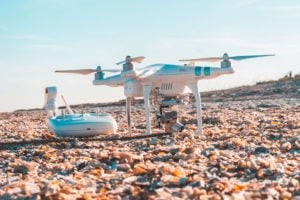The skies are increasingly buzzing with the sound of drones. From capturing stunning aerial photography to delivering packages, these unmanned aerial vehicles (UAVs) are becoming more integrated into our daily lives. As drone technology becomes more accessible and affordable, many are taking to the skies, but a crucial question arises for both hobbyists and aspiring professionals: do you need a license to fly a drone?
It’s a pertinent question, especially when considering the sheer number of drones already in operation. In the United States alone, there are hundreds of thousands of registered drones, yet only a fraction of drone pilots are officially licensed by the Federal Aviation Administration (FAA). This discrepancy leads to confusion and raises important questions about legality and safety in the airspace. The answer to whether you need a license isn’t a simple yes or no; it hinges primarily on why you’re flying the drone in the first place. Is it for fun, or is it for financial gain?
Commercial Drone Operations: Licensing is Mandatory
If your intention behind flying a drone is anything related to business or commercial purposes, the answer is unequivocally yes, you need a license. This isn’t just a strong recommendation; it’s a legal requirement set by the FAA. Whether you’re a real estate agent wanting to capture aerial views of properties, a filmmaker shooting cinematic footage, an inspector assessing infrastructure, or even a hobbyist considering selling drone photography online, you are operating commercially.
The FAA mandates that anyone flying a drone for commercial purposes must obtain a Remote Pilot Certificate, often referred to as a “drone license” or Part 107 license. This regulation exists to ensure safety and accountability in the national airspace. Even seemingly minor commercial activities, such as accepting payment for drone photos or videos, or using drone footage to promote a business, fall under commercial operation and necessitate this license. It’s always better to err on the side of caution and secure your license if there’s any possibility your drone activities could be construed as commercial.
Operating commercially without a Part 107 license can lead to significant penalties. The FAA can impose substantial fines, potentially reaching tens of thousands of dollars per violation. The FAA determines whether a flight is commercial based on your intent at the moment of takeoff. Therefore, even a single instance of unlicensed commercial drone operation can result in hefty fines if discovered.
To obtain a Part 107 license, aspiring commercial drone pilots must pass the FAA’s Aeronautical Knowledge Test. Preparation for this exam typically involves studying topics such as airspace regulations, weather, drone operations, and emergency procedures. Reputable drone training schools, like DARTdrones, offer comprehensive courses designed to equip individuals with the knowledge and skills needed to pass the Part 107 exam and operate drones safely and legally for commercial purposes. Investing in proper training is a wise step towards ensuring compliance and maximizing your potential in the commercial drone industry.
Recreational Drone Flying: TRUST and Registration
 A person happily piloting a drone in an open field, representing recreational drone use.
A person happily piloting a drone in an open field, representing recreational drone use.
For those who fly drones purely for enjoyment and recreation, the licensing landscape is slightly different. Currently, the FAA does not require a Part 107 commercial drone license for purely recreational drone flying. However, this doesn’t mean recreational drone pilots are exempt from all regulations.
The FAA has introduced the TRUST (The Recreational UAS Safety Test), mandated by Congress, for recreational flyers. This test focuses on safety and knowledge of airspace rules relevant to recreational drone operation. While not as comprehensive as the Part 107 exam, TRUST is a mandatory requirement for recreational drone pilots operating in U.S. airspace. You must pass TRUST and carry proof of completion when flying recreationally. The FAA provides resources and approved test administrators to make this accessible to all hobbyists.
Furthermore, drone registration is mandatory for almost all drones, regardless of whether they are flown recreationally or commercially. Any drone weighing over 0.55 pounds (250 grams) must be registered with the FAA. The registration process is straightforward and involves providing basic personal and drone information. Registered drones must also be marked with their registration number.
Why Getting a Drone License is Beneficial Even for Hobbyists
Even if you intend to only fly your drone for recreation, obtaining a Part 107 license offers significant advantages. Think of it like having a driver’s license, even if you only drive for leisure. A license signifies a higher level of knowledge and competence.
Enhanced Safety and Knowledge: Preparing for the Part 107 exam equips you with in-depth knowledge of airspace regulations, emergency procedures, and best practices for safe drone operation. This knowledge makes you a more responsible and safer drone pilot, regardless of whether you’re flying for fun or profit.
Future Opportunities: Hobbies can evolve. What starts as recreational fun can transform into a passion that you might want to monetize later. Having a Part 107 license already in place removes a significant barrier should you decide to pursue commercial drone opportunities in the future. You’ll be prepared to take advantage of any exciting or rewarding career paths that may emerge from your drone skills.
Increased Credibility and Respect: Being a licensed drone pilot adds credibility. Whether you’re interacting with other pilots or flying in public spaces, holding a license demonstrates your commitment to safety and professionalism.
Peace of Mind: Knowing you’re fully compliant with FAA regulations provides peace of mind. You can fly with confidence, knowing you’ve taken the necessary steps to operate legally and safely.
Conclusion: License or Not, Fly Responsibly
In summary, while a Part 107 license is legally required for commercial drone operations in the US, it’s not strictly mandatory for purely recreational flying (though TRUST completion and drone registration are). However, obtaining a Part 107 license is highly recommended for all drone pilots, even hobbyists. It enhances safety, expands opportunities, and demonstrates a commitment to responsible drone operation.
Whether you pursue a license or fly recreationally under the TRUST framework, the most important takeaway is to fly responsibly, understand the rules, and prioritize safety. The skies are for everyone to enjoy, and by being informed and compliant, you contribute to a safer and more organized airspace for all drone enthusiasts and professionals. Consider exploring drone training programs like those offered by DARTdrones to further your knowledge and skills, ensuring you’re well-equipped to enjoy the exciting world of drone flight, legally and safely.

